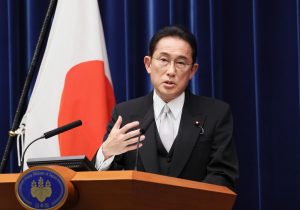Japanese Prime Minister Kishida Fumio said Tuesday he will speed up the drafting and passage of a law to regulate the collection of donations by religious groups and protect families of believers after he met with victims of the Unification Church and was heartbroken by their “horrendous experiences.”
Also Tuesday, a government committee drafted standards to be used to compile questions for investigating the controversial South Korean-based religious group, whose decades of cozy ties with Japan’s governing party surfaced after the July assassination of former Prime Minister Abe Shinzo.
Kishida is attempting to calm public outrage over his handling of his party’s extensive ties to the church. The economy minister was forced to resign last month over his failure to explain his links to the group.
Abe was fatally shot at an outdoor campaign rally in July. The suspect, Yamagami Tetsuya, told police he killed Abe because of his apparent links to a religious group he hated. A letter and social media postings attributed to Yamagami said large donations by his mother to the church bankrupted his family and ruined his life.
The police investigation of Abe’s killing led to revelations of widespread ties between the church and members of the governing party over shared interests in conservative and anti-communist causes. There is a growing call for Kishida’s party to investigate further to determine if its policies were affected by the church’s views.
The case also shed light on the suffering of children of church followers, including some who say they were forced to join the church or were left in poverty or neglected because of their parents’ devotion. Many critics consider the church to be a cult because of financial and mental hardships experienced by followers and their families.
Kishida said he met Tuesday with a number of “victims” of the church.
“I felt my chest torn when I heard from them about their horrendous experiences,” Kishida said. “I’m determined to adopt a new law to accelerate and broaden measures to rescue victims and prevent a recurrence of the problem.” He said he will work with other political parties in drafting and submitting the bill to parliament as quickly as possible.
The investigation of the church could potentially lead to a court decision revoking the group’s legal status, which experts say would be difficult because of the constitutional right to freedom of religion. Opposition lawmakers proposing tougher measures accuse Kishida of being lax because of his party’s coalition partner, Komeito, is backed by a religious group, the Buddhist sect Soka Gakkai.
The Kishida government’s support ratings have nosedived over his handling of the church controversy. Kishida says he has no links to the church and has pledged his party will cut all such ties.
The Unification Church, founded in South Korea in 1954 by Sun Myung Moon, obtained legal status as a religious organization in Japan in 1968 amid an anti-communist movement supported by Abe’s grandfather, former Prime Minister Kishi Nobusuke.
Since the 1980s, the church has faced accusations of devious business and recruitment tactics, including convincing members to donate large portions of their salaries and assets to Moon.
The group has acknowledged cases of “excessive” donations but says the problem has been mitigated since its 2009 adoption of stricter procedures, and has recently pledged further reforms.
Experts say Japanese followers are asked to pay for sins committed by their ancestors during Japan’s 1910-1945 colonial rule of the Korean Peninsula, and that 70 percent of the church’s worldwide funding comes from Japan.

































